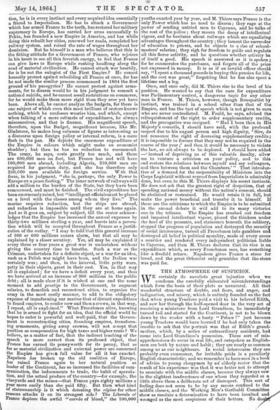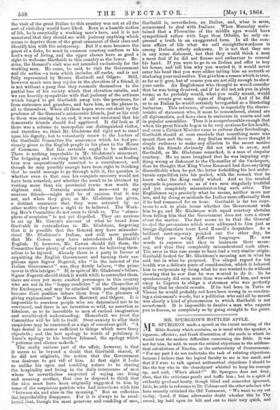THE ATMOSPHERE OF SUSPICION.
WE certainly do novelists great injustice when we condemn the carefully elaborated misunderstandings which form the basis of their plots as unnatural. All that wonderful structure of doubts, and fears and anger, and indignation, and misery, which is entirely founded on the fact that when young Truelove paid a visit to his beloved Edith, and saw her through the half-opened door in the very act of receiving a miniature from Lord Grandison, he immediately turned tail and started for the Continent, is not to be blown down by the reader with a hasty " Pshaw 1" just because young Truelove would have learned if he had only taken the trouble to ask that the portrait was that of Edith's grand- mother, which, by a series of extraordinary accidents, had come into Lord Grandison's possession. These sort of mis- apprehensions do occur in real life, and outspoken as English- men are both by nature and habit ; they are nearly as common among us as our neighbours. In social intercourse they are probably even commoner, for irritable pride is a peculiarly English characteristic; and we remember to have seen in a book of advice to young clergymen by are elderly rector that the result of his experience was that it was better not to attempt to associate with the middle classes, because they always saw in the slightest inadvertence of one whom they regarded as a little above them a deliberate net of disrespect. This sort of feeling does not seem to be by any means confined to the middle classes, and the Working Men's Garibaldi Committee show as resolute a determination to have been insulted and wronged as the most suspicious of their betters. No do the visit of the great Italian to this country was not at all the sort of visit they would have liked. Born in a humble station of life, he is essentially a working man's hero, and it is not unnatural that they should see with jealousy anything which seems to deprive them of the great ornament of their class and identify him with the aristocracy. But if a man becomes the guest of a duke, he must in common courtesy conform to his host's way of living, and the upper classes have as good a right to welcome Garibaldi to this country as the lower. Be- sides, the General's visit was not intended exclusively for the working men. He came, he said, to visit the Government and the nation —a term which includes all ranks, and is not fully represented by Messrs. Hartwell and Odgers. Still, however much men may rejoice in the elevation of a friend, it is not without a pang that they reconcile themselves to the partial loss of his society which that elevation entails, and we can heartily sympathize with that jealousy of the artizans which longed to get Garibaldi away into the provinces, far from statesmen and grandees, and have him, as the phrase is, all to themselves. When all these hopes were cut short by the prudence of the General's aristocratic friends, just as his visit to them was coming to an end, it was not unnatural that his democratic friends should feel aggrieved. It did look as if there was a scheme to monopolize our distinguished visitor, and therefore we think Mr. Gladstone did right not to stand upon his dignity, but to voluntarily renew to the leaders of the Garibaldi Committee the assurances which he had pre- viously given to the English people in his place in the House of Commons. But this certainly ought to be sufficient. There is nothing improbable in Mr. Gladstone's statement. The fatiguing and exciting life which Garibaldi was leading here was unquestionably unsuited to a convalescent, and though he may possibly enough have been right in thinking that he could manage to go through with it, the question is whether even in that case his complete recovery would not have been retarded, and whether the result to be obtained by visiting more than six provincial towns was worth the slightest risk. Certainly reasonable men—not to say anxious friends—might well be of opinion that it was not, and when they give, as Mr. Gladstone has given, a distinct assurance that they were actuated by no other motive they have a right to be believed. The Work- ing Men's Committee do not seem to think so. The "atmos- phere of suspicion" is not yet dispelled. They are anxious to set up Mr. Cowen's account of what he heard from Garibaldi in contradiction to Mr. Gladstone, forgetting that it is possible that the General may have misunder- stood Mr. Gladstone's Italian, and still more possible that Mr. Cowen may have misunderstood Garibaldi's English. If, however, Mr. Cowen should fail them, the Committee have plenty of other resources for believing them- selves to be injured. Already there is a party in favour of acquitting the English Government and turning their sus- picions upon Signor Negretti, who "in the interest of the Italian Government "- was, they firmly believe, "the prime mover in this intrigue." If, in spite of Mr. Gladstone's failure, Signor Negretti should think it worth while to contradict them, there are even yet more exalted personages in this country who are not in the "happy condition" of the Chancellor of the Exchequer, and may be attacked with perfect impunity because their position debars them from "the pleasure of giving explanations" to Messrs. Hartwell and Odgers. It is impossible to convince people who are determined not to be convinced, and there is no invention so wild, no assertion so fabulous, as to be incredible to men of excited imagination and uncultivated understanding. Henceforth we trust the Committee will be left to itself. Over-anxiety to allay their suspicions may be construed, as a sign of conscious guilt. "A. bare denial is answer sufficient to things which mere fancy objecteth ; and the best apology to words of petulancy is Isaac's apology to his brother Ishmael, the apology which "patience and silence maketh."
The really curious part of the affair, however, is that it seems to be beyond a doubt that Garibaldi shared, if he did not originate, the notion that the Government was desirous to get rid. of him. At first sight it looks so unlike his open and confiding nature to be sharing the hospitality and living in the daily intercourse of men whom he nevertheless suspected of saying one thing and meaning another, that one is disposed to think that the idea must have been originally suggested to him by some of the suspicious patriots who had interviews with him between six and nine in the morning." But on reflection dro,improbability disappears. For it is always to be recol- lecte that, though the most generous and confiding of men, Garibaldi is, nevertheless, an Italian, and, what is more, accustomed to deal with Italians. When Macaulay main- tained that a Florentine of the middle ages would have sympathised rather with Iago than Othello, he only ex- pressed a truth in an exaggerated form. In all the com- mon affairs of life what we call straightforwardness is among Italians utterly unknown. It is not that they are in any sense dishonest, but that they would think a man a mere fool if he did not finesse and endeavour to conceal his hand. If you were to go to an Italian and offer to buy his house, and tell him why you wanted it, it would never enter his head that you were either telling him an untruth or disclosing your real motive. You give him a reason which is true, so far as it goes, but of course you are not silly enough to shew your cards. An Englishmen who thought so would consider that he was being deceived, and if he did not ask you in plain terms, as he probably would, what you really meant, would at all events give some signs of disgust. And if he did so to an Italian he would certainly be regarded as a blustering barbarian. This reticence, of course, is especially the charac- teristic of statesmen who, it must be remembered, abroad are all diplomatists, and have risen to eminence in courts and not in popular assemblies. Thus it is comprehensible enough that when his great friends began to be very anxious for his health, and even a Cabinet Minister came to enforce their forebodings, Garibaldi should at once conclude that something more was meant than met the ear. Any Italian would have thought it simple rudeness to make any allusion to the secret motive which his friends obviously did not wish to avow, and Garibaldi, as Mr. Gladstone remarked, is a man of singular courtesy. He no more imagined that he was imputing any- thing wrong or dishonest to the Chancellor of the Exchequer, than he thought that King Victor Emanuel had done anything discreditable when he put the letter forbidding his last unfor- tunate expedition into his pocket, with the remark that he knew what the King really wished. And so the comical spectacle is presented to us of two men singularly truthful and yet completely misunderstanding each other. The Englishman says precisely what he means, neither more nor less, and by doing so misleads the Italian more effectually than if he had romanced for an hour. Garibaldi is far too cour- teous to ask in plain terms whether the Government wish him to go, and Mr. Gladstone with equal courtesy abstains from telling him that the Government does not care a straw about the matter. The fact seems to be that the General treated the persuasions which were addressed to him just as foreign diplomatists treat Lord Russell's despatches. As a brilliant contemporary pointed out the other day, he and they are using different languages. )1ti uses words to express and they to insinuate their mean- ing, and thus they completely misunderstand each other. The error in this ease seems to have had a very similar origin. Garibaldi looked for Mr. Gladstone's meaning not in what he said but in what he proposed. The alleged regard for his health was a delicate piece of consideration, which it behoved him to reciprocate by doing what he was wanted to do without showing that he saw that he was wanted to do it. So he spontaneously did even more than was asked of him, and went away to Caprera to oblige a statesman who was perfectly willing that he should remain. If he had been in Turin or Vienna he would probably not have been wrong in so constru- ing a statesman's words, but a politician who said all he meant was clearly a kind of phenomenon to which Garibaldi is not accustomed. It is impossible to deceive a man who expects you to finesse, so completely as by going straight to the point.































 Previous page
Previous page